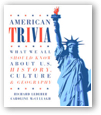Many Of Our Words And Phrases Are Rooted In Religion
- RICHARD LEDERER
Because our society has become somewhat secularized, we overlook the religious foundation of our daily parlance.
 Easter, which commemorates the resurrection of Jesus Christ on the third day after his crucifixion, was the earliest feast day decreed by the ancient Christian church. Many Christians consider the season leading up to Easter to be the holiest time of the year in their faith. This seems like a good time, then, to think about the influence of religion on the words we speak and hear and write and read every day.
Easter, which commemorates the resurrection of Jesus Christ on the third day after his crucifixion, was the earliest feast day decreed by the ancient Christian church. Many Christians consider the season leading up to Easter to be the holiest time of the year in their faith. This seems like a good time, then, to think about the influence of religion on the words we speak and hear and write and read every day.
We think of carnivals as traveling entertainments with rides, sideshows, games, cotton candy and balloons; but the first carnivals were pre-Lenten celebrations — a last fling before penitence. The Latin word parts, carne, "meat, flesh," and vale, "farewell," indicate that the earliest carnivals were seasons of feasting and merrymaking, "a farewell to meat," just before Lent.
The word religion derives from the Latin religionem, "respect for what is sacred." Carnival is one of many words and expressions that began in religion. Because our society has become somewhat secularized, we overlook the religious foundation of our daily parlance:
bonfire: Originally the bone fires that consumed the bodies of saints whom were burned during the English Reformation.
enthusiastic: From the Greek enthusiasmos, "a god within." The word first meant "filled with God," as did giddy, from Anglo Saxon gydig, "god-held man."
excruciating: The Latin word for "cross," crux, is embedded in the words crux, crucial and excruciating, which has broadened from denoting the agony of the crucifixion to any kind of torturous pain.
fan: A clipping of fanatic, "inspired by the temple." The opposite, profane, describes a person who is irreverent and sacrilegious, from the Latin pro, "outside," and fanum, "the temple."
good-bye: Our traditional farewell turns out to be a shortening of the sentence "God be with you."
holiday: Originally a "holy day," descending from the Old English haligdaeg. With the change in pronunciation has come a change in meaning so that holidays, such as Independence Day and Labor Day, are not necessarily holy.
icon: In its original meaning, icon was a small religious painting used as an aid to devotion. In its new meaning, icons are now people who achieve superstar status in the worlds of politics, sports, the arts and entertainment. Many consider this change to be a debasement of a perfectly good word.
red-letter day: So called because of the practice of calendar and almanac publishers of printing the numbers of saints' days and religious feast days in red ink. Such days now describe any distinctive day in a person's life, such as birthdays, graduations and the day the local sports team wins a championship.
short shrift: In bygone days, political offenders and military captives were executed almost out of hand. There was but a thin pretense of justice in which the prisoner could confess (shrive) his sins to a priest and prepare his soul for death. Those who kept these unfortunate souls in thrall often allotted but a short time for confession, and this hurried procedure became known as short shrift. Nowadays, this compound means "to give scant attention, to make quick work of."
story: Why can story mean both "a tale" and "the level of a building"? Both words come down to us from the Latin historia, "to know," and French histoire, where it means both "a tale" and "the discipline history." The endurance of the meanings "tale" and "floor" is architectural. Back in the Middle Ages, it was the custom in many parts of Europe to paint scenes depicting historical, legendary, biblical, or literary subjects on the outside of the various floors of buildings. Each level represented a story, and, before long, the levels themselves were called stories.
 This is Meaghen Gonzalez, Editor of CERC. I hope you appreciated this piece. We curate these articles especially for believers like you.
This is Meaghen Gonzalez, Editor of CERC. I hope you appreciated this piece. We curate these articles especially for believers like you.
Please show your appreciation by making a $3 donation. CERC is entirely reader supported.

Acknowledgement
Richard Lederer. "Many Of Our Words And Phrases Are Rooted In Religion." Verbivore (March 28, 2015).
Reprinted with permission from Richard Lederer.
The Author

 Richard Lederer is an American author, speaker, and teacher. He is best known for his books on the English language and on word play such as puns, oxymorons, and anagrams. His weekly column, "Looking at Language", is syndicated in newspapers and magazines throughout the United States. His website is Verbivore. Among his books are American Trivia Quiz Book, American Trivia, and A Tribute to Teachers.
Richard Lederer is an American author, speaker, and teacher. He is best known for his books on the English language and on word play such as puns, oxymorons, and anagrams. His weekly column, "Looking at Language", is syndicated in newspapers and magazines throughout the United States. His website is Verbivore. Among his books are American Trivia Quiz Book, American Trivia, and A Tribute to Teachers.




